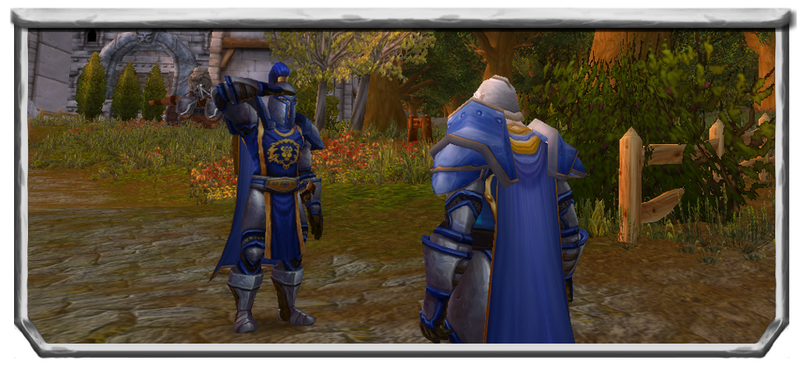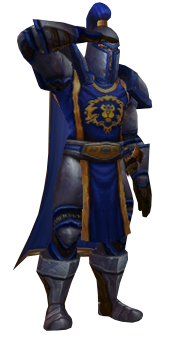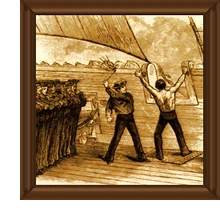
The General Conduct chapter of the Stormwind Army Field Manual covers the deportment and conduct of soldiers and auxiliaries of the crown. All soldiers of the Royal Army are expected to follow and uphold these guidelines.
Courage and self-sacrifice are our soul, but so too are order and method; for without standards, an army is just a band of brigands. In this chapter, we will lay out the standards you are expected to fulfill.
The King and his subjects, noble and common alike, expect all personnel to maintain high standards of conduct. The citizens’ faith in the King relies heavily on their well-founded belief that we, the soldiers of the Royal Army, will act on the King's will in order to benefit the kingdom as a whole. The following passages are the standards of general conduct that soldiers of the King's army are expected to uphold at all times.
Duty and Leave[]
As a soldier, you are sworn to perform the duties of defending the realm and aiding the citizens. When you arrive, you are to Report for Duty and be prepared for whatever duties may be before you, whether they are marching, performing manual labor, exercising diplomacy, or combat. Unless you are unable to do so, you must report for duty to the established duty post of your unit.
When your unit is “at home”, your duty post is Westbrook Garrison, in the Bailiwick of Rien, Westridge.
You are not required to report for duty if you have been granted Leave. You may request personal leave from an officer, to attend to personal affairs; medical leave is typically granted by request of a doctor or medic, and only when the soldier will be unable to attend to his duties.
You may be granted single-day leave if your performance has been satisfactory, and if your request is submitted in a timely and respectful manner. Single-day leave is only granted subject to the needs of the Royal Army, however; you are not guaranteed leave for reasons other than the above.
The Oath of Service[]
"Upon my honor I do swear undying loyalty to His Majesty, King Anduin Wrynn, and unwavering obedience to the officers of his great kingdom. Under guidance of the Virtues Three, I swear to defend the kingdom's bloodline, holdings, laws and subjects with my life. I shall uphold this oath until death takes me or I am released from service. May those above judge me, and those below take me, if I fail in my duty. Long live the King. Long live the Kingdom.”
The Counter Oath is one issued by the recruiter, promising what the Royal Army will offer in return for the recruit's service.
"I accept your oath. I vow to always have a place for you amongst our soldiers, to reward honest work, and to ask of you no service that would bring you dishonor. We shall provide you with arms and lodgings fit for your new station. Rise a defender of the realm beneath the banner of the House of Wrynn."
Respect[]
A respectful atmosphere is a productive atmosphere, and the Army is tasked with getting results. There are many ways to show Respect, but the single, overarching guideline is this:
Treat all fellow soldiers and citizens with dignity and honor.
While new recruits may expect a certain degree of harsh treatment in their training process, soldiers should not disparage or disrespect one another on grounds not related to their duties. This directive has no exceptions for species, race, religion, rank, sex, or sexuality. Repeated refusal to extend courtesy and respect to other soldiers and citizens will not be tolerated. Unwanted sexual advances or harassment will be dealt with harshly.
If you feel you are being unduly harassed or denigrated, you may seek out a superior ranking officer to report the harasser and describe the actions committed.
Integrity and Honesty[]
Integrity and honesty are the most valued traits a soldier may bear when serving in the Royal Army. Lying, cheating, misleading, and stealing are not tolerated in any form. If soldiers cannot trust one another to do the right thing off of the battlefield, they cannot be expected to trust one another in the heat of combat when their very lives are on the line. Deliberate dishonesty, be it by word, action, or in written form, should be punished swiftly and severely, no matter the rank.
Attitude[]
Every soldier of the Royal Army should maintain a positive and enthusiastic attitude when completing their military duties. Do not complain, do not snivel, and certainly do not quit. You represent the King of Stormwind and his military. How you behave reflects on the Royal Army as a whole. Do not stain the honorable reputation hard-won by the blood, sweat, and tears of those who came before you.
Following Orders[]
Every soldier within the Stormwind Army is required to Follow Orders of his or her superiors without question or complaint if they are within the bounds of the Laws of Stormwind.
Subordinates may privately bring their concerns to their superiors in regards to their assigned orders and duties. While officers and staff of the army are not obligated to heed the advice and suggestions of their subordinates, they should be receptive to criticisms and suggestions regarding the army's operations and pass relevant ones up the chain of command for review or adoption.
That said, all soldiers, staff and officers of the royal army are expected to follow the Laws of Stormwind and Stormwind Military Law and the conduct expectations established in this manual. The soldiers carrying out a command are just as responsible for the outcome as the soldier who issued the command. Being ordered to break the law by a superior is no excuse for a soldier of the crown to breach the army's protocol.
If a superior gives an order that would without doubt violate the King's Law or the Laws of the Royal Army, a soldier is expected to disobey the command and report their superior up the chain of command as soon as possible.
Insubordination[]
Insubordination means not submitting to legal authority or not following legal commands given by superiors. In the military setting, insubordination is not tolerated.
Asking for clarification or reasoning behind commands is not considered insubordination, but questions fielded to superiors must be tactful and relevant. Officers and staff should generally provide as much information and clarification as possible, but they are not obliged to answer questions if they involve classified or sensitive information or if an objective is time critical.
The orderly execution of legal orders is vital, and so, insubordination is heavily punished. Depending on the severity of the offense, a soldier may lose multiple ranks, be subject to flogging, or even receive a Dishonorable Discharge.
Chain of Command[]
In His Majesty's army, commands must be issued and executed swiftly to carry out the king's will. The Chain of Command is in place to foster effective communication and execution of orders, and to maintain clear and disciplined communication.

Downward Flow of Command[]
In general, military personnel give orders only to those directly below them in the chain of command and receive orders only from those directly above them. An officer is usually expected to give orders only to his or her direct subordinate, even if it is just to pass an order down to another service member lower in the chain of command than said subordinate. Example:
- A Lieutenant wishes to have a Corporal drive a mule-drawn wagon. Instead of the Lieutenant giving a direct order to the Corporal, he would give the order to a Sergeant, who would then tell the Corporal what to do.

Upward Flow of Relief[]
A service member who has difficulty executing a duty or order and appeals for relief directly to an officer above his immediate commander in the chain of command is likely to be disciplined for not observing the chain of command.
Example:
- A Private has been ordered to drive a wagon, but he doesn’t know how to handle a mule team. He would first seek aid from a Corporal, and then a Sergeant if the Corporal could not help him.

By serving in the King's army, you are expected and obligated to follow the chain of command, regardless of rank. Those who fail to follow the chain of command will face correction or punishment if it becomes a chronic issue.
Saluting[]
Saluting is the iconic act of professional respect among soldiers. What began as knights lifting the visors of their helms to show their allies friendly intention has evolved into a gesture that is known and employed today as the salute. In the First Regiment, only officers ranked Lieutenant and above are saluted.

Saluting is necessary when:
- Approaching a knighted officer of equal or higher rank;
- Transferring leadership of a formation to an officer;
- Passing or greeting officers and knights of allied military units;
- Being formally addressed by an officer; or
- After being saluted by a lower ranking officer.
- After being dismissed by a superior officer.
- The king's colors are raised as a standard or flag.
Saluting is unnecessary when:
- In formation;
- Addressing a prisoner;
- Your hands are occupied and you are unable to empty them;
- You are off-duty and in civilian clothes; or
- Addressing Recruits, Privates, Corporals or Sergeants.
When you address a Corporal or Sergeant, rather than saluting, the proper protocol is to come to attention and await permission to speak.
Wear Headgear While Outdoors, Remove Headgear While Indoors[]
In general, it is expected that soldiers of the Stormwind Army wear their helmets, hats, hoods, and other headgear while outdoors, and remove them while indoors when not in any combat situation.
If combat is expected or started in the immediate area, soldiers are expected equip and wear their headgear regardless of whether they are indoors or not.
The highest ranking soldier or officer present may give the order to remove or equip headgear if any situation demands it.
Exceptions and Considerations:
- It is especially important to remove one's headgear while in a place of worship, such as the Cathedral of Light.
- Soldiers should wear their headgear while indoors if assigned as a guard detail to an officer or person of interest, treating the situation as if expecting combat at any moment.
- Some soldiers have religious or other practical exemptions from orders to remove or equip headgear. Paladins, chaplains, and battlemages specifically have permission to wear circlets that do not need to be removed indoors.
- Medical personnel treating patients are expected to wear face coverings whether they are indoors or not.
- Soldiers handling volatile or noxious materials are expected to wear face coverings whether they are indoors or not.
Permission to Speak[]
When on Army business, the highest-ranked soldier is in authority and speaks for the group. If the highest-ranked soldier becomes unable to speak for whatever reason, the next soldier down in rank and authority must take over. You should only speak if you are that soldier in charge, directed to speak, or given permission. When in formation or in the presence of superiors, you must always ask Permission to Speak except at Rest position, when you may typically speak freely.
Dismissal[]
When you are addressed by a superior ranking soldier of the Stormwind Military, do not leave that superior's company until directly given permission to be Dismissed or given orders to carry on with their duties. If this permission is not forthcoming but there’s nothing else for you to do, you may ask, "Permission to be dismissed?"
Dismount Before Superiors[]
Soldiers of the Royal Army, if mounted on a horse or piece of siege equipment, should dismount before they address superior ranking soldiers when not in combat. Soldiers should give the same respect to senior ranking nobility of the Kingdom of Stormwind and its allies. Dismounting is unnecessary if in hostile territory or a combat situation.
Addressing Civilians[]
If you do not know the subject’s name, address them as "Citizen." If you do know the citizen’s name, address them by either “Mr./Mrs./Miss/Ms.” and their last name (the preferred form of address, as it is more formal and courteous), or "Master/Mistress" and their first name.
Examples:
- "Citizen, please step aside."
- "Master Thomas, a pleasure to meet you."
- "Do you require anything else, Mrs. Jackson?"
When greeting subjects or allies of the kingdom, politely introduce yourself by name, rank, and the unit of the army you serve.
Example:
- "I am Private Rolof, with the First Regiment of the Elwynn Brigade. How may I be of assistance?"
If you are not already on issued orders, assist civilians whenever and wherever possible. If a task is too difficult for you to handle or you are not sure how to carry it out, seek out other soldiers for help.
Addressing Enlistedmen[]
Enlistedmen of the Royal Army must always be addressed by their rank when spoken to. If multiple soldiers of the same rank are present, address the one you wish to speak to by rank, followed by his or her family name. Do not address enlistedmen as "sir" or "ma'am," as that is a form of address reserved for officers.
Examples:
- “Permission granted, Recruit Davis.”
- "Private Tucker, go scout out that hill."
- "Yes, Corporal."
- "Sergeant Williams, may I speak with you in private?"
Addressing Officers[]
Most officers of the Royal Army are also knights of the Brotherhood of the Horse. They may be addressed with the following forms:
- By their rank, just as you would an enlisted soldier, e.g., "Captain" and optionally their family name, or
- by their honorific "Sir/Dame" and their first name, if they are knights, or
- by their noble title (see next section), if they hold such, or
- simply as "sir" or "ma'am."
All of the forms above are interchangeable at your discretion.
Examples:
- “Lieutenant, may I be dismissed?”
- “Sir John, where did you need us?”
- “I must report to Dame Lione.”
- “Reporting for duty, sir!”
Addressing Nobility[]
Lords and Ladies may be addressed as such, or by officer ranks if they have them. Either is correct. To address them with more familiarity without their permission is a form of disrespect, and is punishable under Army regulations.
Examples:
- "Lord Richard, you are needed by Lady Grace."
- "Yes, m'lord."
- "Commander, what would you have me do?"
It is courtly custom to bow when greeting nobility of Stormwind or any high ranking dignitaries of its allied nations. The gesture shows the respect deemed necessary to the noble blood of the realm.
When dismissed or excusing oneself from the presence of a nobleman (including the King), proper respect must be given to station.
Proper procedure for departing a noble is as follows:
- Once dismissed, salute if the nobleman holds military rank;
- Take two or three steps backward, facing the nobleman (about a yard);
- Bow; then
- Turn and depart.
Immediately turning your back to a nobleman is a sign of disrespect and insubordination in the military and can be punished by summary flogging.
Addressing Royalty[]
To be addressed by the King of Stormwind or any other Royalty is a tremendous honor, for the line of Wrynn is a line of heroes and great men. Being humble as well, they fight at the side of their soldiers, and often speak directly to their men. It is to the King that you have sworn your service, and the orders you carry out are his will.

The first thing to be aware of is that, unless you are specifically obeying orders or there is a grave emergency, do not speak to the King unless spoken to; it is his privilege to initiate contact. Should he do so, immediately kneel and remain silent until told to rise and speak. When prompted to speak, always address the king as "Your Majesty," maintaining utmost formality and humility in the king's presence. It is not strictly incorrect to address a member of royalty as “sir” or “ma’am”, particularly as a soldier, but it is much preferred to use “Your Majesty”.
When you are dismissed from his presence, depart in the same way as you would any officer holding noble rank: salute, step backward three feet, bow, and then turn to depart. If he has given you orders, carry them out with all haste.
Deployment[]
Deployment refers to when a unit of the Royal Army is posted in a location other than their typical duty post, including locations outside of the Kingdom of Stormwind. On deployment, every soldier must be present and accounted for at the deployment post, not moving about elsewhere in Azeroth. Unless given specific permission to leave, a deployed soldier must stay in the designated deployment area. This area will be described to you when you are briefed upon arrival.
Soldiers who knowingly break this rule and leave the field of operations without permission will be summarily suspended from duty. Those who are found to have knowingly abandoned their post and found out of uniform will be charged with desertion. All deserters should be hunted down and brought before the commander of their unit to face judgement.
However, we as a guild understand if you want to take a day for yourself or want to role-play with friends outside of the guild on a day that falls within a planned in-character deployment or campaign. There are generally two options for you to take if you don't want to role-play in the deployment area during a campaign on a given day:
- 1. Ask an officer in-game or on Discord for an in-character "Leave of Absence". This will allow your character to completely leave the battlefield and deployment zone in order to do as they wish at home. Officers generally grant this request in most circumstances, but abusing this option may hinder your character's chances at promotion as they will be seen as shirking their duty.
- 2. Role-Play in a "Flashback" or "Future" session set in a time not during the campaign. In order to preserve the continuity of your character still being on deployment, you can pretend that the time you are role-playing outside of the deployment zone was either before or after the campaign in a flashback or future session of role-play. This will allow you to still take part in events and role-play during a campaign.
Rules of Engagement[]
The Rules of Engagement are the central set of rules handed down by High Command that govern how military operations start and are carried out. With every conflict, the Rules are examined and adjusted to suit the circumstances and the needs of the Army, but unless High Command orders otherwise, the following rules absolutely govern your actions as a soldier:

Do...
- Fight combatants who are declared hostile. Combatants are all persons participating in military operations or activities or pose an immediate and active threat to you, your unit, or other friendly forces.
- Apply enough force to complete your mission. Discourage further hostilities with as few engagements as possible.
- Detain or secure unwilling, possessed, or mind-controlled combatants if possible. Regard the mission and the overall safety of those personnel present.

Do not...
- Do not give gifts, trade, fraternize, or discuss tactical details with enemy personnel. Such actions are considered treasonous in most circumstances and will be reviewed for court martial.
- Do not harm or kill enemy personnel who surrender. Enemy personnel may surrender to you in battle. "Surrender" shall be defined as willfully ceasing combat and giving up one's weapons, and if they wield magic, verbally surrendering. Those who surrender should be taken prisoner as defined later in this chapter. Should circumstance demand it, at the behest of command staff, whether it be by military or governmental decree, environmental or logistical difficulties, or other situations that may not allow the capture or transportation of prisoners to allied territory, enemy prisoners may be subject to summary execution in the name of the King. Regardless of circumstance, the officer in command who chooses to execute enemy prisoners shall be reviewed for foul play or misconduct.
- Do not falsely surrender. Surrendering falsely to enemy soldiers is a dishonorable act and shall put any allies who surrender truthfully at risk. If you must surrender, follow through with the action.
- Do not torture enemy prisoners of war. Such is the duty of certified torturer's guild members and agents of SI:7.
- Do not attack noncombatants. This includes civilians, sick and wounded, clearly marked medical personnel, enemy prisoners of war, and chaplains.
- Do not misuse protected symbols. It is dishonorable to use peaceful banners like the Argent Crusader's standard to lure enemy combatants into traps.
- Do not mutilate the corpses of enemy humanoids, or take any appendage or body part as a form of 'trophy' or 'token'. Such may, however, be taken from vanquished animal or bestial foes at the discretion of present officers.
- Do not use forbidden magics. Necromancy, Fel Magic, Void Magic, Blood Magic, and Shadow Magic are all expressly forbidden to soldiers of the First Regiment.

Always...
- Collect and care for all wounded. This includes surrendered enemy personnel and civilians, though they rank lower in order of triage. They should be provided with food, water, and medical care if supplies permit it.
- Respect private property and possessions of civilians. In times of strife during deployment, the army may be forced to seek out supplies and resources from elsewhere. To this end, should foraging prove insufficient, enemy territory may be raided for the purpose of gathering vital supplies such as food, weapons, armor, etc. Furthermore, the army may have to exercise force in order to acquire these supplies from the local populace, which may turn hostile and defensive in the face of an outside army. However, should the army have ample supplies and arms with which they can win engagements, it is expected that the crown's troops refrain from seizing property from civilians.
- Report actual or suspected violations of protocol up the chain of command.
Host Nation Sensitivities[]
The Royal Army is often the only face of Stormwind that people of other nations can see. The actions of one soldier can forever destroy the reputation of his kingdom in the eyes of a Host Nation. This being the case, you as a soldier must maintain and uphold the highest standards of appearance and conduct when you are on deployment to foreign lands.
On deployment, you are considered to be on duty 24 hours a day, 7 days a week. This means that while you are deployed, you are forbidden to be intoxicated, use excessive and obscene language, engage in inappropriate physical displays of affection, or be out of uniform other than to sleep or bath - unless told otherwise by a commanding officer. You must conduct yourself with the same courtesy toward the locals as you would toward citizens of Stormwind, and defer to local authorities.
You will be briefed on differences of culture and law, and possible pitfalls, when you arrive, and briefed before missions on any that might have an impact on how you carry out your duties. By no means should you stop there, though; learn as much as you can about the local culture, customs, and conventions before you deploy. Your willingness to learn about other people and civilizations will impress and honor them, and you will often find them more willing to forgive accidental offenses.
Property and Wildlife
- Damaging property or injuring wildlife can be punished differently in foreign nations.
Religion
- Not all nations follow the Holy Light. Displaying religious icons may be offensive to our hosts.
Appearance
- What may be acceptable in Stormwind may be offensive elsewhere.
Literature
- Beware of anything that might be constituted as illegal in some countries.
Social Customs
- Learn the do's and dont's of the host nation.
Off Duty Conduct[]
Even when you are Off-Duty, you still represent the Royal Army, and you represent a force for order in an often chaotic and hostile world. The King, his subjects, and our allies place great trust in us, and it becomes our responsibility to uphold that trust.
Both in and out of uniform, you are still expected to uphold the law, and be respectful and courteous to everyone you meet. Do not engage in brawling, public disturbances, or public intoxication, and lend assistance to your fellow soldiers when needed.
Be aware: You may be subject to discipline if you break the public’s trust.
Off Duty Attire[]
Be mindful of your attire, even when you are not on duty, and especially during formal occasions involving the church, nobility, or other important people. When you attend a formal occasion or enter a place of worship, do your best to wear clean and pressed clothing, in good repair, that is not too distracting or revealing.
Soldiers who wear attire deemed inappropriate may be reprimanded by their superiors and ordered to change into appropriate clothing. If you are invited to attend a formal event but cannot afford appropriate clothing, seek out a Corporal or above; the Army may be able to help you.
Fraternization[]
Fraternization, when the word describes conduct between soldiers, is the act of showing affection in a non-platonic manner. During deployments or while on duty, flirtation, open-mouth kissing, groping, and sex are all prohibited between all enlisted soldiers of the crown and all are considered punishable offenses.
With the exception that Recruits are not permitted to engage in romantic or sexual relationships with other soldiers of the Stormwind Army, note that it is not the relationship that is prohibited; it is the display of affection that comes of it that is out of place in a professional environment. Hugs, chaste kisses, and hand-holding are permitted between those in a relationship, but such should be done sparingly and may be addressed if displays of affection become excessive.
In order to help you avoid accusations of fraternization, the Army assigns double-occupancy tents only to members of the same sex, who are not married or engaged. Soldiers at the rank of Recruit are further prohibited from engaging in any form of fraternization and/or relationship with their peers as it is a Recruit’s duty to learn their trade, and any form of romance is an unnecessary distraction thereof.
In time of war, no soldier of the Stormwind Army is permitted to interact casually with any enemies of the kingdom in any way. This includes correspondence, having a drink, idle conversation, and business transactions. All interactions with the enemies of the Kingdom are to be done under the supervision of an officer. Violations of this absolute rule may be met with court martial and dishonorable discharge.
Any inappropriate conduct should be reported up the chain of command to be addressed by your superiors.
Handling Prisoners[]
Prisoners of war are enemy soldiers or traitors captured by allied soldiers. Taking prisoners of war, be they enemy soldiers or deserting troops, can happen at any time, so it is vital that you be prepared to properly Handle Prisoners to the expectations of the Royal Army.
Should you take a prisoner, your first responsibility is to secure the prisoner against escape. Restrain them as much as necessary. Search the prisoner for anything dangerous or of intelligence value with an armed colleague watching.
Once the prisoner is secure, contact your commanding officer as soon as possible. Transport your prisoner to a holding location that your CO designates, and make sure to post a strong guard.
When you are in the presence of prisoners, keep your mouth shut and your ears open. Do not engage in any form of communication or discussion with prisoners, aside from issuing necessary orders, unless given the express command to do so from a senior rank. Never discuss military details of sensitive or confidential nature within sight or earshot of a prisoner (an act which is considered treason). Limit communication between prisoners, and record anything the prisoners say and send it up the chain of command.
Prisoners are to be escorted to prison camps or jails as soon as possible. This is sometimes carried out by the unit that captured them, but usually, soldiers or operatives from other units will arrive to take custody and escort them. In the case of a transfer of custody, an officer will handle the transfer and ensure that the prisoners are prepared to travel. Under no circumstances, however, should a prisoner of war be released without express approval of the Royal Military Council or the King himself.
If Taken Prisoner[]

If Taken Prisoner by enemies of the kingdom, the only information you are permitted to give is your name and rank. Do not disclose tactical information to the enemy, and never accept preferential treatment in exchange for said information. Escape and aid others to escape if possible. Should you escape, evade the enemy and return to the nearest holdings of the Kingdom of Stormwind as soon as possible.
Pregnancy[]
As the druids say, “Life finds a way”. We value the lives of all of our citizens, born and unborn; as such, it is absolutely forbidden for any pregnant soldier to be placed in a combat situation, for her safety and the safety of her child. Pregnancy in the armed forces is a serious matter.
Pregnant soldiers are assigned to noncombat duties, and do not travel on deployment with the rest of the Regiment until a satisfactorily secure outpost (such as a fortress not expected to come under attack) and safe supply routes are established. Any soldier who knowingly orders a pregnant soldier into combat or other high-risk situation is to be brought up on charges. Any woman who knowingly endangers her unborn child in combat while in service to the Royal Army is to be immediately discharged from the King's service.
Honorable Discharge[]
There come circumstances where a soldier must resign or be reassigned to a different unit of the King’s service. Should a soldier resign or be excused from his duties on good terms with the unit they are leaving, their leave will be considered Honorable Discharge. For this distinction, a soldier must speak directly to one of the officers of their unit and formally resign from service before leaving their post.
Soldiers who are honorably discharged at the rank of Private or above may be offered Holding Rank should they return to service at a later date. While returning soldiers are typically offered the holding rank of Private, officers may bestow higher rank at their discretion based on the needs of their unit.
Disciplinary Actions[]
In His Majesty's Army, non-commissioned officers (Corporals and Sergeants) and knighted officers are authorized to punish their subordinates as necessary to maintain order. These Disciplinary Actions may be reviewed by the officers for validity and proportion to the offense, but when they are issued, they are to be carried out. The following methods of discipline have been approved by High Command, in order of increasing severity.

Involuntary Physical Training
Corporals and above may assign their subordinates to physical training for minor infractions such as forgetting to salute or improperly addressing their superiors, etc.

Laborious Special Duties

Corporals and above may assign their subordinates to special duties for repeated minor infractions such as forgetting to salute or improperly addressing their superiors, etc. Examples may include kitchen duty, digging a new latrine pit, refuse burning, harvesting raw materials, sorting scrap and salvage, cleaning arms and armor, etc.

Retraining
Sergeants and above may assign their subordinates to attend basic retraining to relearn concepts they believe need to be reinforced. If retraining does not correct a soldier's behavior, harsher punishments may be invoked.

Flogging

Lieutenants and above may issue corporal punishment in the way of flogging to soldiers who suffer great failures or embarrassments that dishonor the king, his noblemen, the church, or his army. Flogging may be issued privately or in public depending on the severity of the offense. Officers would do well to ensure that corporal punishment does not render a soldier unfit for combat duties. Soldiers who are flogged should receive brief medical attention after the punishment is issued to check the severity of their wounds. Medical attention must be non-magical to allow for natural healing; this regulation may be disregarded at the discretion of the officers under extreme circumstances.
A demotion or dishonorable discharge should be offered in lieu of flogging for those unwilling to receive this punishment.

Demotion in Rank

Lieutenants and above may reduce a soldier's rank to what they believe would be fitting for both their competence and willingness to follow protocol. All demotions in rank are reviewed by the commanding officer of a unit.

Dishonorable Discharge
Lieutenants and above may dishonorably discharge a soldier if they believe that he or she is not worthy of remaining in service to the King and his army. Any soldier who is dishonorably discharged shall not receive any benefits and shall be barred from returning to service in the Royal Army.


Execution
Marshals and above may order a soldier to be executed if he or she is proven to have committed high treason, deserted a field of battle, or deliberately killed civilian non-combatants. Execution should be the absolute last resort for any commander dealing with one of his soldiers. It is at the discretion of the commanding officer of a unit whether or not banishment from the Kingdom of Stormwind is offered as an alternative to death.

Stormwind Army Field Manual
General Orders •
General Conduct •
Ranks •
Unit Composition •
Drill and Marching
Uniforms and Armor •
Arms and Weaponry •
Ammunition & Reagents
Survival in the Field •
Safety •
Logistics •
Terrain & Reconnaissance •
Law Enforcement
Fortifications & Sieges •
Strategy & Command •
Hound Mastery •
Horsemanship
Signal Policy